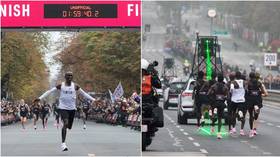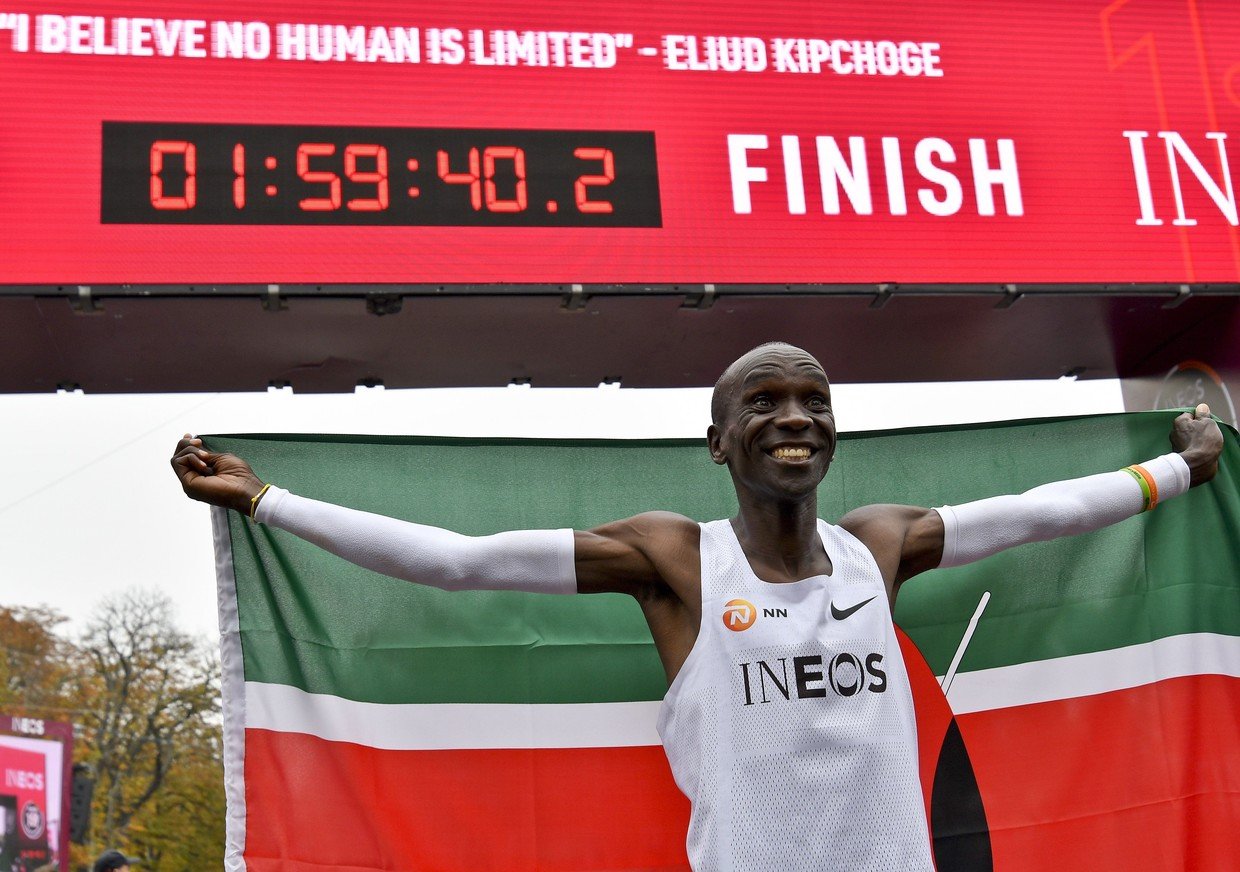Laser beams, an army of pacesetters & special Nike shoes: How Eliud Kipchoge ran the first sub 2-hour marathon

Kenya's Eliud Kipchoge carved out his own piece of history by becoming the first person to run a marathon in less than two hours in Vienna on Saturday, with every element of the run being scrutinized beforehand.
The Ineos 1:59 Challenge, as the effort was called, was an orchestrated attempt designed for Kipchoge to run the course in Vienna, Austria in under two hours, with a pace car beaming a laser on the to the track to indicate the required pace of 2:50 minutes per kilometer. The 34-year-old never went slower than 2:52 per kilometer at any point in the race.
Also on rt.com ‘He didn't even look tired!’ Kenya's Eliud Kipchoge makes history by becoming first person to run sub 2-hour marathon (VIDEO)To put the record breaking run into context, Kipchoge had to run 100m in 17.08 seconds 422 times in succession at a speed of no less than 21.1kph (13.1 mph).
He was 10 seconds ahead of the pace at the halfway mark of the race before appearing to slow in the second half but upped his times as the race reached its conclusion.
Kipchoge was helped throughout the race by a team of 42 pacemakers, who would run in formation around Kipchoge in part to make him aware of the required pace he was to run and also to provide wind resistance.
🇬🇧 1954 Roger Bannister breaks the 4-minute mile🇺🇸 1969 Neil Armstrong walks on the moon 🇯🇲 2009 @UsainBolt runs 100m in 09.58🇰🇪 2019 @EliudKipchoge runs a sub two-hour marathon#INEOS159#NoHumanIsLimitedpic.twitter.com/HMXnxRohE3
— INEOS 1:59 Challenge (@INEOS159) October 12, 2019
Olympic 1,500m champion Matthew Centrowitz, Olympic 5,000m silver medallist Paul Chelimo and the Ingebrigtsen brothers Jakob, Filip and Henrik were among the pace runners, rotating in and out of the race to run in formation around the Kenyan.
"They are among the best athletes in the world - so thank you," said Kipchoge of those who assisted him on the course. "I appreciate them for accepting this job. We did this one together."
Kenyan fans going wild for Eliud Kipchoge breaking two hours for the marathon. What a scene from his home country. pic.twitter.com/LE8YBZcVNu
— Chris Chavez (@ChrisChavez) October 12, 2019
He was also provided with water and energy gels by team members on bikes during the effort, practices which are outlawed by the IAAF and part of the reason why it will not be considered an official world record.
Even the location of the race in Vienna's Prater Park speaks to the meticulous preparation which went into giving Kipchoge every possible advantage to set the time, as it has almost completely flat terrain.

Kipchoge was also provided with a set of personalized running shoes by Nike featuring a custom design based on the shoes worn by the athletes who have run the five fastest marathons in history.
"I'm feeling good. After Roger Bannister made history, it took me another 65 years. I've tried but I've done it," added Kipchoge, who holds the official world marathon record, having clocked 2 hours 1 minute and 39 seconds in Berlin in 2018,
"This shows the positivity of sport. I want to make it a clean and interesting sport. Together when we run, we can make it a beautiful world."
Also on rt.com 'It hit a nerve': Trieste half-marathon reverses 'racist' ban on African runnersKipchoge, who failed in a similar attempt by 25 seconds in 2017, asked that the course be lined with spectators to help him push through in the final stages of the race.
It appeared to work, as Kipchoge increased his pace in the final stages, prompting Sir Jim Ratcliffe, the British billionaire who funded the attempt, to exclaim that the "last kilometre where he actually accelerated was super human."













